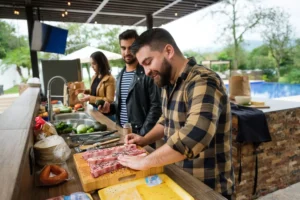“I’ve never really been that interested in babysitting,” my friend shared with me over coffee one afternoon. A single woman, she had been struggling over what it looked like to live as a Christian woman in a subculture that often praises childcare and baking as hallmarks of biblical femininity.
“I like kids,” she said, “I just was never the one to volunteer to babysit when I was a teenager. Does that mean I’m not a godly woman?”
My friend is a godly woman. She is good at her job and has already received one promotion. She loves her local church and can be found many Sundays greeting visitors with a warm smile or praying for a friend who is weary. She wants to obey God and believes that it matters that she is a woman; she just doesn’t always know how her femininity can (or should be) expressed in her singleness.
Few things stir up more controversy and confusion than this whole godly womanhood thing. While it is helpful (and good) to talk about womanhood in the context of marriage and children (I am married and I have children, so I’m thankful for them), single women can especially feel left out or that they are in a biblical womanhood holding pattern.
You may hear about being a suitable helper for your husband and wonder how that can be applied to your life when there is no husband in sight. Your pastor may preach on the life-giving aspect of womanhood, and you struggle to see how that can be manifested in your life when you have a perpetually empty womb with no hope for children in the near future. Is there any way for you, a single female, to live out this godly womanhood thing?
I think so.
In my book, The Accidental Feminist: Restoring Our Delight in God’s Good Design, I attempt to show God’s good design for us as women is not owing to our marital status or season in life. It’s rooted in something much deeper. But what I also do is show how feminism has tried to fill a void that only God’s Word can fill.
For my friend who doesn’t like babysitting, feminism would tell her that she doesn’t need to like babysitting or kids. Feminism would tell her that there is no true femininity. Feminism tells women that they define themselves and that their identity is found not in a husband, children, father or anyone else besides themselves. Feminism seeks to answer our confusion about God’s design and distort it. So while it is true that our identity is not found in any earthly relationship, I do think being a woman means something more than that we simply have different plumbing. Here’s what I mean.
You Are Telling a Story
When God created Adam and Eve, He made a very clear declaration about their identity. They were image bearers. Their very existence was to mirror the God who created them. When Adam named the animals, he exhibited authority over creation in the image of his Creator (Genesis 2:19-20). When Eve was made to be a suitable helper for Adam, she imaged her Creator who also is called “helper” throughout the rest of Scripture (Genesis 2:20). Both Adam and Eve were given the task to rule and reign over God’s creation, to be fruitful and multiply, and to obey God’s words to them (Genesis 1:28-29). But they also were given a clear distinction: male and female (Genesis 1:27). While some of our image bearing is owing to our humanity, the rest of it is owing to our femaleness.
It matters that you are created female because in your femaleness you tell a story about the God who created you. Your identity is found in the God who created you with an overarching purpose — to display His glory to a watching world. Embracing God’s good design for you as a woman is not a throwaway concept or an outdated principle from a generation gone by. It is rooted in the creation account, when God brought forth His creation to tell a beautiful story about himself. Understanding what it means to be a woman, and not a man, is understanding what it means to image God in a broken and fallen world, including being a life-giver and helper.
Life-Giving in a Broken World
Perhaps you have heard it said that women are called to be “life-givers” and wonder how that is possible for you as a single woman who has yet to bring life into the world. Or maybe you are like my friend, and you have never seen yourself as a “kid person.” When Adam named his wife Eve, he did so because she was to be the “mother of all living” (Genesis 3:20). But prior to that point, she had not given birth to a child. Part of this is owing to the fact that he was, in her naming, holding on to the promise that from her the Promised Seed would come to crush the head of the serpent. But the other part is owing to her uniqueness as a female. She was uniquely tasked with bringing life into the world and nurturing life in the face of death that had suddenly come upon them.
All throughout Scripture, we are given glimpses of this life-giving work. Abigail uses her discernment and courage to save her household and husband from sudden judgment at the hands of David (1 Samuel 25:18-35). The Hebrew midwives protect and save baby boys from the hands of the Egyptians set on destroying them (Exodus 1:15-20). Ruth clings to Naomi with no hope for life beyond her barren widowhood, serving her in the face of tremendous heartache (Ruth 1:15-18). Death is all around us, isn’t it? Whether it is in the thorn and thistle infested mundane of your work day or in the relationships with your roommates, you have an opportunity to be a means of life to the people God has placed in your life, even when death and sin are knocking at the door.
My friend Andrea models this well, spending her free time after work investing in her city. For years she has lived in the inner city, surrounded by abandoned houses and latchkey kids. And she has always been all in. Whether it is in a cooking club for the neighborhood kids, tutoring at the local school, or running with her neighbor, she seeks to be an aroma of life to her community, when death and sin are ever present realities.
A Helper With a Purpose
Another way that God gives us our identity as women is in making us helpers. Whenever we hear someone say that a quality of godly womanhood is to be a “helper” we get a little uneasy, don’t we? Our mind conjures up images of domestic servitude and weak women. But that’s hardly the case.
God is actually called a “helper” a number of times throughout Scripture (Psalm 46:1; Isaiah 49:8; John 14:16). Helper is no more beneath us than it is with the Godhead.
While you are not commanded to be a helper to all men in the same way that a wife helps her husband, your role as a helper is still vital in God’s economy. Just like a wife is tasked with using all of her gifts, abilities, wisdom and personality to be a suitable helper for her husband, so you can (and should) seek to use all that you possess to serve God, His people, and the world.
Your role as a helper in your job or your church is not a form of servitude, but a tremendous asset. If you love crunching numbers or organizing, your abilities serve a vital purpose to the people in your congregation. This is a help to the continued ministry of the church. If you sense a burning desire to teach God’s Word or disciple a new believer, this is a help to the spread of the Gospel and God’s glory being displayed. But it’s not just in your local church that you can exercise this part of your femininity.
In your job, every skill you possess, every idea you have, and every deadline you meet is for the good of your company and the testimony of Christ in your life. In your relationships with friends and family members, when you discern a need in their life and meet it, or spend time listening when someone is in a difficult situation, you are exercising your personality, gifts and abilities to be a help to the people God places in your path.
As a woman, you bring things to the table that are needed in every sphere of your life. You bring perspective that the men in your life won’t necessarily have simply because you are created differently. While Eve was called a “suitable helper” for her husband, meaning she was uniquely gifted to meet his needs, all women are uniquely gifted as a necessary component of imaging God to a watching world through supporting, helping and serving those around them.
The point of being a helper is not service for service’s sake. It’s so God gets glory in the story of our lives. It’s so His goodness, mercy, faithfulness, kindness, patience and love is displayed through us, His image bearers. Everything you are matters in your role as a life-giver and helper because He is the one who gave you every gift you possess to use for His glory.
God did not make a mistake when He made you female, nor did He put you on the womanhood waiting list in your singleness. When God looked at all He had made, including man and woman, He declared His creation good — and His image bearers very good (Genesis 1:31). Your femaleness is a beautiful thing because it images the One who made you to glorify Him with everything you are.
You can begin telling a story about God and His good design for us as men and women by growing in godliness and understanding how He gifted you uniquely. Your womanhood is not on hold, sisters. And you don’t need to just like babysitting to be a godly woman.
Copyright 2015 Courtney Reissig. All rights reserved.











